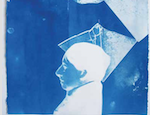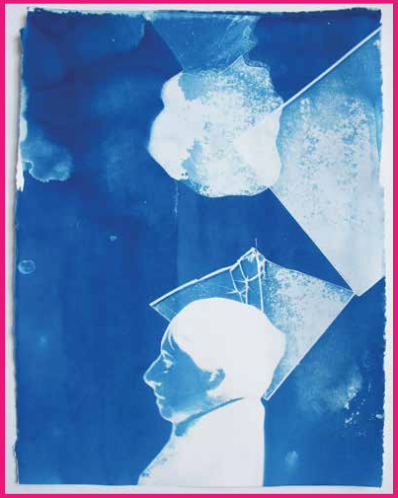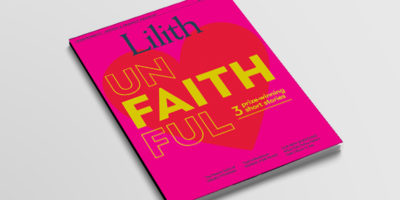
Fiction: A Serious Infatuation
Second Prize in Lilith's 2019 Fiction Contest

Art: Ofri Cnaani
FOR THE LAST SIX MONTHS I’VE SAT in Margo G.’s office as she prepares to counsel grieving families. At first it was twice a week. Now, I manage a visit every day. My teaching schedule is lighter in the summer and this back and forth wouldn’t be possible if the law school and the hospital weren’t next to each other. We met last winter. I was interviewing health care professionals in preparation for the course I’ll teach in the fall, Euthanasia and The Law.
Margo is a terminal care nurse passionately committed to the dying—a cheerful, in-your-face kind of girl with smiling blue eyes and fabulous ginger hair. Her generous figure moves with purpose as she searches for a patient’s chart, or preens herself for a meeting. Discretion reminds Margo that the grief-stricken do not want to deal with the pink flesh of her upper arms, so she slips on a white lab coat over those sleeveless cotton dresses. She’s partial to square necklines and full skirts, large printed flowers. Peonies are her favorite—crumpled, mauve blossoms. Watching as she brushes her hair, powders her face and freshens the gloss on her full lips, desire overcomes me. I’ve never experienced anything like it, not even in the beginning with Ellie.
The truth is, I’m infatuated. I love everything about her. When something strikes her as humorous, she nearly comes apart with her rowdy laughing and coughing. There’s probably far too much smoking and drinking going on. I suppose when you’re involved with death every day, you cry more and laugh harder than the rest of us. No one knows about Margo—not my colleagues, not my friends. I feel awful.
Margo and Ellie are total opposites. Ellie Rutenberg, my wife. High strung, for sure, but what panache. Tall, with a lean 1930’s figure and bobbed dark hair, clothes look terrific on her. In fact, she looks better in clothes than—never mind. Margo, on the other hand, is far better out of her peony dresses. Ellie’s mother, Gloria, claims her daughter has always been tied into knots. Probably. Gloria sees eye to eye with me on many things, far more than Ellie.
It’s Sunday. In a couple hours, we’re hosting a barbecue for my graduate students. I’m sitting here in my study trying to finish up these lecture notes for my class tomorrow. Is it hard to swallow that Theodore Whistler is a professor of jurisprudence? Believe it or not, they wanted me as interim head. I declined, though I’ve been chairing the search committee. The administrative part is deadly. Thank God for the seminars and my writing. This morning I was up early intending to work, but I went for a walk instead. The air was fresh from last night’s rain. Too early for people, I saw a few cats and dogs obediently waiting on front porches, parked tricycles and bikes, doors closed—houses still with sleep. But now the cool air has disappeared and it’s hot and humid. Through my study window I see Ellie standing beside a daisy bush. The muggy heat surrounds her as she leans over to snip off dead blooms and gather fresh ones for her basket. She’s wearing the floppy hat that hides her eyes and a long shift—that raw linen thing with grass and twigs woven into the fabric. A friend of hers brought it back from India. It’s too predictably hippie for my taste, but I guess it’s attractive. Whatever she puts on looks good, but they’re just tasteful clothes, if you know what I mean. They’re never her statement, never an extension of her body and soul.
Ellie can spend hours alone in the garden. At least we have that in common. She teaches in Women and Gender Studies. Whatever.
After all these years, she still won’t drink with me.
“Jews don’t drink,” she says.
Even the kids say it when they catch me pouring a Scotch and offering one to Ellie.
“Daddy, don’t you understand? Jews don’t drink!” First Amy, then little David.
My mother-in-law comes to my defense. I’ve never known Gloria to refuse a Scotch, and when Ellie and the kids frown at her, she laughs it off.
“Well, I guess I’m not a very good Jew, and your daddy isn’t one at all, so there!”
Our daughter, Amy, is struggling with preparations for her bat mitzvah and Ellie’s been after me to attend services and convert. It has become a cause for her in these last few months. It began around the time I met Margo G., but that’s a complete coincidence. Sometimes I look out this window and see her working—the determined digging, the eager weeding. I watch, exhausted by her fervor. Does the possibility of my conversion goad her brain?
I’m toying with the idea. Why not? I wouldn’t be giving up anything. Religion has never been a part of my life. Despite everything, I want to please her, and the paths seem few. Incidentally, the thought intrigues my father. I called him last week.
“What a splendid intellectual exercise!” I could hear my old Dad pulling himself together at his kitchen wall phone in Oregon. He spends the days alone, studying his map collection, trying to keep from going under. He’s never been one for religion either. Mother was the keeper of our Lutheran heritage. It died with her—like the secret treasure, buried with her sea captain grandfather.
“Conversion?” Gloria was appalled when she heard. “You’re wacky. And as for Ellie, I’ve no idea where she gets off being observant’. She certainly wasn’t raised that way!”
“It’s her statement,” I tell Gloria, “she’s defining her territory.”
“Territory indeed! What baloney, what chutzpah! God knows, Joe and I never went in for that stuff. When the boys were of bar mitzvah age, then yes, briefly, but not before, and certainly not after.”
Two Scotches later, Gloria adds that Joe would turn over in his grave if he knew his grandchildren were attending religious school. “For Joe, that would be the opposite of progress.”
There she is, my Ellie, with the daisies in her hand and the hat brim covering her eyes. Is she hiding? Is she crying? My God, does she suspect? I’ve never wanted to hurt her. She glances towards the garden gate.
Gloria enters, smiling cheerfully, cheeks flushed, cake carrier in hand. She lives only blocks away and she walked. Vigorously, I’m certain. Khaki shorts, a pale blue T-shirt and off-white canvas hiking hat. She approaches her daughter. They exchange a pecky kiss, those two tall women. Despite Gloria’s consumption of Scotch and Ellie’s obsession with conversion, they’re very close. I must never forget I’m the outsider, in case my mind is so blurred by alcohol that life seems to be going my way. Ellie pats her mother’s back. Gloria gently touches her daughter’s face. She’s brought her famous strawberry shortcake and she’s come early to help prepare for the party.
I’ve been envious of their physical ease, their mutual affection. My mother never touched my face, and I didn’t pat her back. We didn’t do that in my family. Or maybe it was because of the gender thing, but it didn’t happen with my father either. Perhaps such crippling issues are dealt with in the Gender Studies Program. I sound sloppy and sentimental, but I covet Ellie and Gloria’s closeness, their naturally affectionate manner. Margo is the same. She hugs everyone. Her family didn’t, she once told me, but she’s learned. She’s learned to be demonstrative from those who are nearing death.
Does that mean it won’t happen for me until I’m dying? That’s a stupid thought. I’ve worked hard to achieve what I have—my family, career, home. I’ve been lucky, and I love my life. Am I a fool to throw it all away?
I wonder what Margo’s doing? Is she “lying out” as she refers to it? I don’t believe for a moment she truly exposes all that pink flesh to U.V. rays. She wants me to believe she indulges herself, that she’s still vibrant enough to challenge life with “risky” behavior. Margo knows I worry. What a piece of work. I need her, but we’ve agreed never to contact each other when I’m home.
“YOU’VE ALWAYS DEFENDED HIM, MOM, but I tell you, something’s wrong.” Ellie’s voice is anxious, her eyes soulful as she stares down at the basket, gently running her fingers along a daisy stem.
“Ellie, you’re such a worrywart! Can’t you relax, darling?” Gloria considers her daughter’s face.
This was the most difficult of all her children, by far the loveliest, the most intelligent, but certainly the most insecure. Gloria often wonders how she failed her daughter. What happened to the child, Ellie, to make her so unsure, so apprehensive?
“No, I can’t relax. His grad students will be arriving soon, and she’ll be among them. What if I discover who it is? How should I act?”
“Like a lady, my darling. Always like a lady.”
“Cut the crap, Mom! Just tell me what I’m supposed to do.”
“And how are you going to discover who it is?”
Ellie drops her eyes. “It might be something obvious, something
awful and obvious.”
“What? A clandestine kiss behind the wisteria?”
“You know what I mean!” Ellie removes her hat in exasperation. “Why do you insist on treating this as a joke?”
“I’m sorry darling, but you’re being silly. Theo adores you,” Gloria whispers, leaning towards her daughter until their foreheads touch. “Theodore Whistler positively worships you.”
Ellie pulls back, exasperated. “I wish I could be so certain.”
Gloria throws back her head and laughs.
“Never mind,” Ellie pouts. “Forget it. Come help me in the kitchen.”
As the two women walk around the back of the house and into the kitchen, Ellie turns to her mother. “He was watching us the whole time we stood in the garden. He watches from his study window. He stares at me when I work with the flowers. He’s jealous of us.”
“Honestly, Ellie, sometimes you don’t act like a grown woman with children.”
“Think what you want, but I’m telling you, he’s jealous of us,” Ellie repeats, a tight smile forming on her thin lips.
Gloria realizes she hasn’t seen Ellie smile for days. Even like that.
THE CHILDREN ARE HOME FROM SWIMMING. I hear them talking in the kitchen, opening cupboards and drawers, probably helping themselves to cereal. Gloria will be “doctoring” as she says, the potato salad. She puts in lemon juice instead of vinegar, a spot of yogurt with the mayonnaise. Ellie lets her do what she wants in the kitchen. She doesn’t care. The kitchen is not her domain. The garden and children, her teaching, her recent obsession with the temple, these are Ellie’s preoccupations. In fact, I do most of the cooking. It’s one of my pleasures.
I usually spend Sundays preparing food for the week. I put on music and cook up a storm. On the days that Ellie and I both get home late, I’ll call the children from the office, instructing them on the oven temperature for the casserole waiting in the fridge. Having instilled them with the fear of God regarding danger and accidents, I follow up with cautionary reminders about the hot oven. The truth is, I fret constantly, mostly about freak accidents: the toddler who blows away his mouth and chin by licking the outlet; the child who runs into the street for a ball; the teenager who dives into a murky, shallow lake and ends up a quadriplegic. I worried while Ellie was pregnant—gross deformities. Gloria laughed. I had to tell someone. It was such a relief when the babies were born, healthy and pink and screaming their lungs out.
I adore them, but I don’t tell them. Ellie says the words “I love you.” Gloria does too. I’m a professor of jurisprudence and I can’t articulate love. Gloria teases me. She can’t understand why I make myself so crazy. Neither can I. She says the kids are incredible—they’d never do anything dangerous or careless. I know, and they’re responsible, too. They set the table and make a dinner salad. Gloria’s always available, only blocks away, just in case. She’s been wonderful about taking over when we can’t be there—car-pooling, evenings, trips. Not that Ellie and I go away together. Not in years. She claims it’s too much of a hassle. The truth is, she’s not interested in being alone with me. I guess I’ve lost my charm.
Ellie is probably arranging her daisies in the blue glass vase. Last month I ordered it from the Chicago Art Institute gift shop. She was impressed, saying she wasn’t aware I was interested in museums and their gift shops. She asked what the occasion was.
“No occasion,” I blurted, tongue-tied. I should have said more.
When Ellie is done with her flower arrangement, she’ll step back to look, engrossed with the composition. There’ll be the adjustment of a stem or two, more yew for greenery, more water in the vase. Ready. She’ll carry it over to the mantle in the living room.
If I am to keep Margo G., I will have to leave my family. I’ll see the children once a week and they’ll spend every other weekend with us, probably hating Margo. Isn’t that the way it is—divorce, the division of property, custody issues? Conversion will be out. Gloria might still have a drink with me occasionally, but I mustn’t forget that I am the outsider when it comes to Gloria and Ellie Rutenberg.
“Mom says it’s time to start the barbecue.”
Amy is standing in the doorway. She’s wearing a turned-around baseball cap and her little bikini bathing suit. She looks so fresh and young. I want to tell her to change, to put on something more protective. My children’s skin shouldn’t be exposed to the sun, but I’m trying to be a good father. I say nothing.
“I’m coming.” I reach for my hat on the desk and follow my daughter outside.
It has turned into a perfect, summer afternoon. The clouds are gone, the sun is out and there’s a slight breeze to carry away the heat. I feel better. Walking towards the garage, I wave to Gloria in the kitchen. She’s standing at the patio door, smiling, drying her hands on a dishtowel. I see Ellie coming out of the supply closet carrying paper plates and napkins, plastic cutlery. She looks stressed. Only 20 minutes ago she was picking daisies. If flowers can’t help her, how can I?
Amy is tagging behind me. She wants to help.
“It’s dark in here, Daddy.”
“I know. Watch your step, Amy.”
In the dim light of the garage, I find the bag of briquettes. I hear Amy behind me.
“What can I carry, Daddy?”
I look around. The briquettes are too heavy, and I don’t want her carrying matches. I reach for the can of lighter fluid.
“Carefully,” I say, handing her the can and bending for the briquettes.
I pass the clumps of peonies, flopped out across the lawn. They look heavy and exhausted. I think of Margo’s dress with the white field, the bruised blossoms. This year, I will have to dig them up, separate and replant, if we are to have decent blooms next summer. The thought of garden work is pleasing, but then I remember the party and the socializing with my students. I’m not up to it. I empty the bag of briquettes into the barbecue.
“Let me spritz it, Dad!”
“Better not, Amy. I’ll do the fluid. You can light it.” She agrees.
I watch as she carefully strikes the match. I’ll have to make small talk in answer to polite questions. They’ll ask if we built the house, if we designed the garden. Ellie will be aloof, Gloria, friendly. The kids will want to play ball with the students.
I watch as the flame licks up in excitement. Instinctively Amy pulls back her hand and drops the match. I see it fall to the ground near her foot.
LATER, AT THE HOSPITAL, I REALIZE that Amy must have squeezed the can as she carried it from the garage to the barbecue, spilling lighter fluid on her legs. There was no other way the liquid could escape. The can had to be squeezed or shaken. The lid was on, but I didn’t warn her not to squeeze. She’s only a child. What happened? I’m always so hysterically cautious. I was preoccupied, that’s what happened, I was obsessing while my daughter was dribbling lighter fluid down her legs.
I sink, lower and lower, as we sit and wait, as I try to explain to Ellie, to Gloria, my Rutenberg women. It doesn’t do us any good. Ellie weeps, Gloria comforts her. I am the outsider. Ellie looks at me with hate.
I could buy a hundred blue vases and fill them with all the daisies in the world. I could convert to Judaism three times over. I could give up Margo. I could do all this and more, but the truth is, my wife does not hold me in her heart, and probably never did. It’s that simple.
Alone, I wait to see how bad it will be for our Amy.
Nina Barragan was born in Córdoba, Argentina. Her three books of fiction are No Peace at Versailles, Losers and Keepers in Argentina and The Egyptian Man. She lives in Iowa City, Iowa, where she is at work on a memoir.


